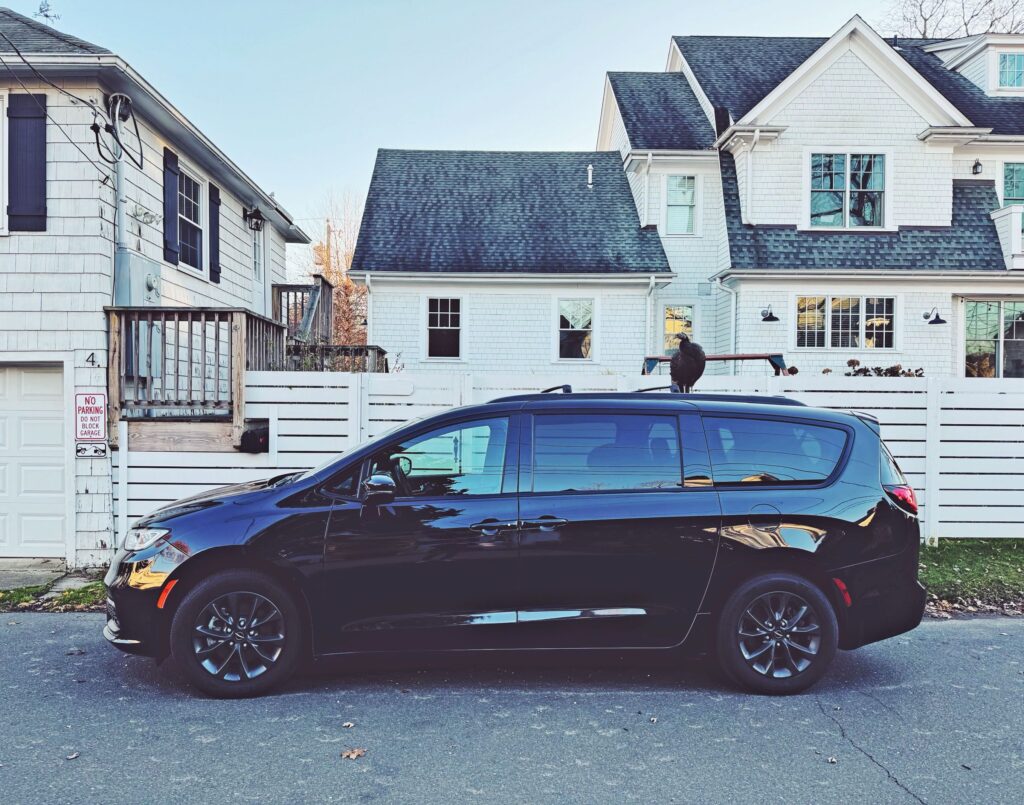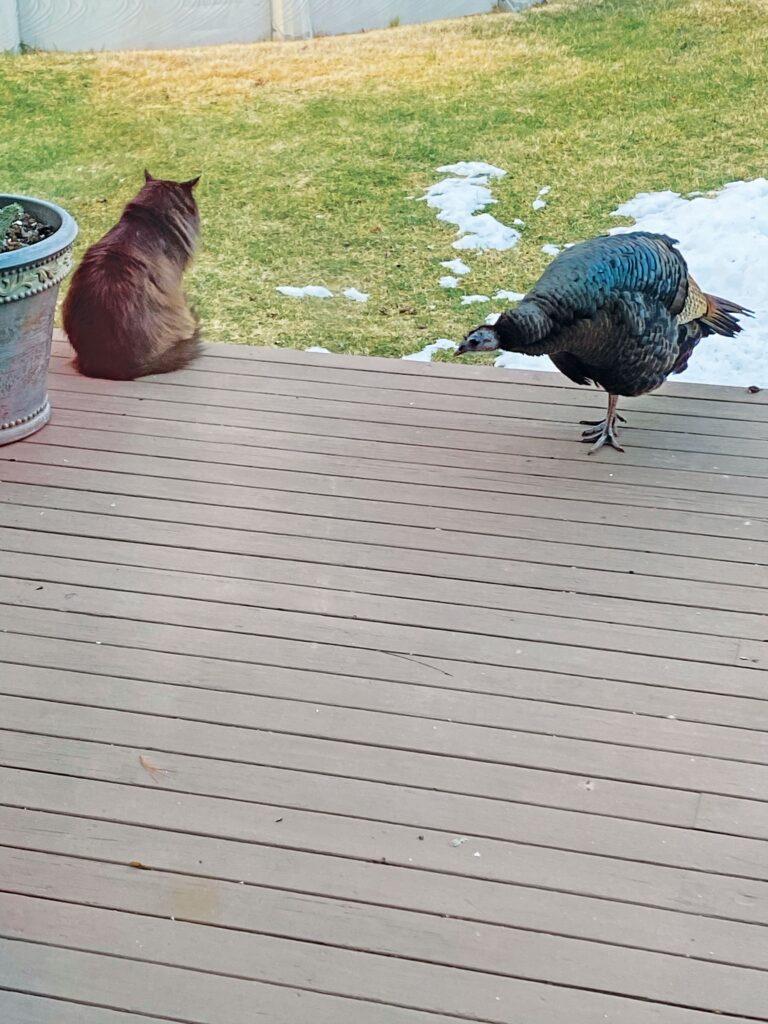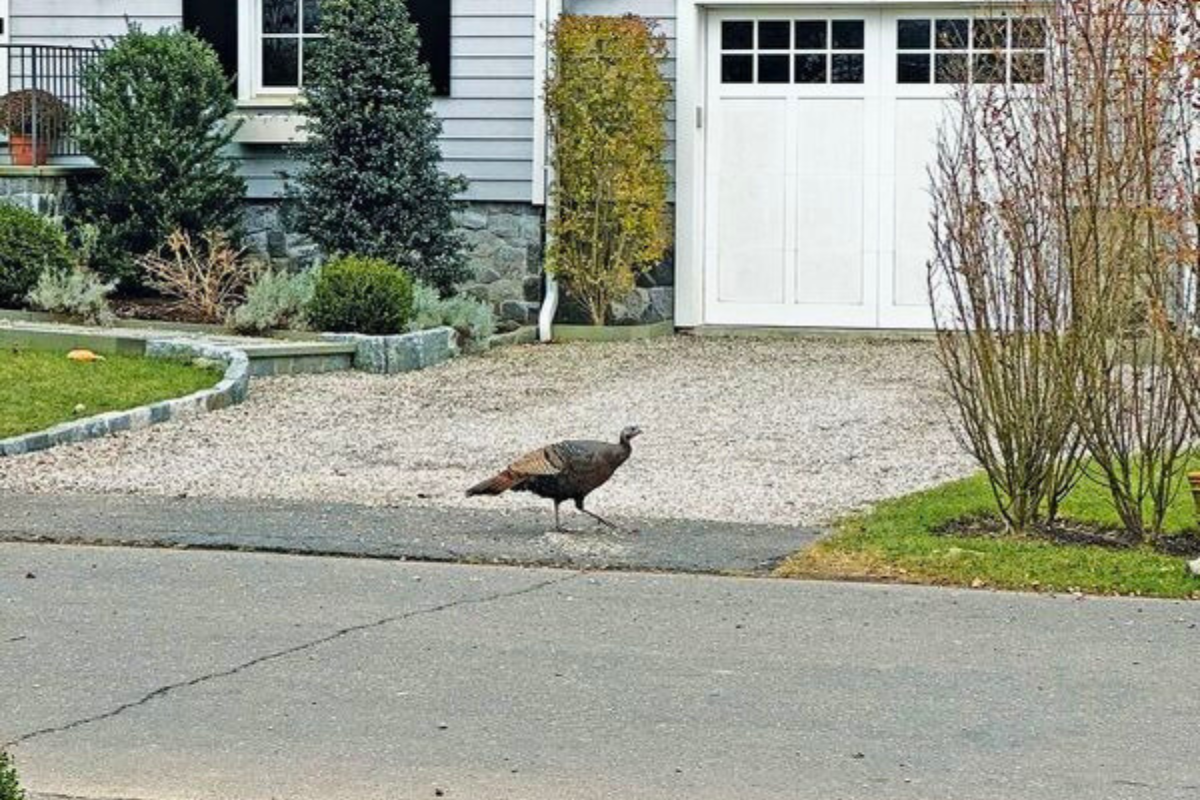by Priscilla Feral
When January 2024 arrived, a curious female wild turkey started visiting our yard in the coastal Connecticut community where we live. She roosted in our maple tree at night, ate seed from bird feeders, chased other birds, watched us move around the yard and occasionally even sat on our car.
We were entranced by her.
She also visited our neighbors, hopping fences and even sat next to a neighbor’s cat on their porch. They also adored and were fascinated by her. I hoped that the affection residents expressed prompted them to stop eating turkeys on all occasions.
Then spring arrived, and after she clucked or yelped a few times at the end of our driveway, she left town and headed up the road toward the town in which FoA is headquartered. Perhaps she answered calls of other female hens, or male wild turkeys (gobblers) demonstrative about attracting a group of hens to get to the top of the turkey hierarchy in that area.

It’s obscene that wild turkeys are one of the few bird species that anyone dares to hunt during their breeding season. A dominant gobbler—maybe the one with the best-looking beard or whatever it is that wows female turkeys—is selected by the hens to be their breeding partner. That one gobbler tends to control the breeding in his territory.
It is that magnificent creature who is most targeted by hunters.
It’s almost unthinkable that turkey hunting is second only to deer hunting as the most popular blood-killing sport in the U.S.—attracting two million people. Every spring turkeys are hunted in 49 states and the sad, perverse spectacle is used to recruit children to hunt.
State wildlife agencies that have treated hunters like clients are desperate for new sources of revenue since hunting license fees continue to bottom out when old hunters die and young ones don’t materialize. Hunting has long been in free-fall.
Still, a small group of degenerate fools get a thrill from killing. And even bragging about it.
When Gov. Kristi Noem in South Dakota was auditioning to be Donald Trump’s vice president, she tried to generate interest in her book by bragging about the puppy and goat she executed. She also had photo shoots released of the many dead pheasants, deer, bears and other trophy animals she shot with bullets or arrows for the joy it brought her including a male wild turkey. I hereby nominate her for FoA’s 2024 Hunting Slob of the Year.
Unfortunately, there are likely many contenders for her title who participate in the U.S. Super Slam, an annual wild turkey hunting event across the country. It’s considered the most difficult of killing contests, requiring wild turkey hunters to kill and register turkeys from all 49 states except Alaska. That’s why small states like Rhode Island attract so many out-of-state hunters.
Otherwise, why would residents of Texas, California or Missouri who boast the highest number of wild turkeys travel to Rhode Island to shoot one? This event awards those who complete and register a pin and certificate.
If it wasn’t so gruesome turkey hunting would be laughable.
Hunters imitate turkey calls to attract gobblers early in the morning when they drop from the trees in which they roost. “Fanning” permits these goofballs to use and hide behind a gobbler decoy—they can be foldable plastic or inflatable— and advance toward the turkey to trick him into think they are a turkey so he’ll charge them and be in shooting range.
How pathetic.

The good news is that these cowardly, barbaric practices are being met with more disdain than ever before, as is hunting in general. Fanning is illegal in Alabama, Michigan, New Jersey, Pennsylvania., Rhode Island, South Carolina and New Hampshire.
Fanning had been “discouraged” in CT, but will soon be prohibited by regulation in 2025 thanks to FoA pressing CT Dept. of Energy and Environmental Protection, our state wildlife agency, to eliminate it.
More good news is the hunting industry continues to fall apart by its own dead weight. There are even shakeups of wildlife agencies as a result. You can read more about the industry’s downward spiral in this issue.
Whether we’re changing minds, laws or regulations, wildlife deserves a fighting chance and an end to the atrocities that have been protected by state and federal wildlife agencies for far too long. We’ll stay devoted to that task.

